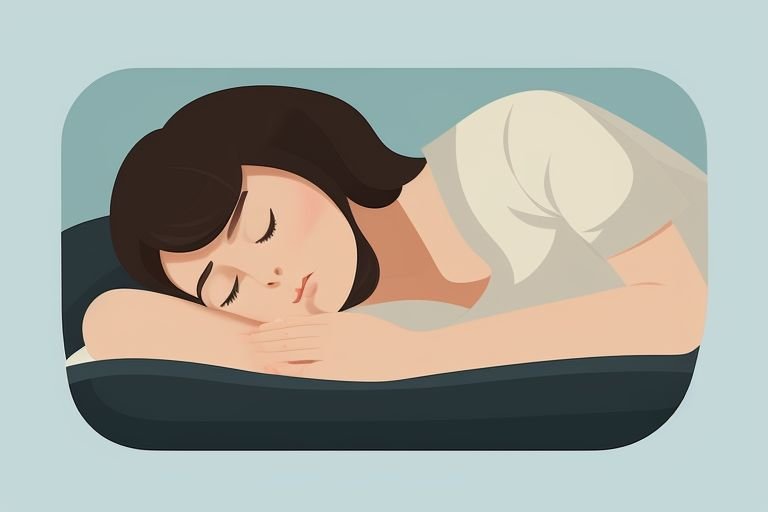Tips for better sleep after overeating
After a hearty meal or late-night snack, drifting off to sleep can sometimes feel like an uphill battle. The discomfort of overeating, including heartburn as well as acid reflux, can disrupt our quest for rest. But fear not! There are simple and effective ways to help you ease into a peaceful slumber even after indulging a bit too much. So, let’s explore these strategies to ensure you get the sleep you deserve after enjoying a satisfying meal.
1. Sleep on your left side

- Research suggests that sleeping on your left side can reduce the likelihood of gastroesophageal reflux (GER) compared to sleeping on your right side.
- GER, commonly known as acid reflux, can disrupt sleep and cause discomfort.
- By choosing to sleep on your left side, you may experience fewer GER symptoms, thus allowing for a more restful sleep.
2. Elevate the head of your bed

- Raising the head of your bed by about 6 inches (15 cm) can help alleviate heartburn, a common issue after overeating.
- This elevation can prevent stomach acid from traveling up the esophagus, reducing the discomfort associated with heartburn.
- You can also achieve this elevation by placing foam blocks under the bedposts or using a foam wedge under your pillow.
3. Treat an upset stomach with ginger

- Ginger has long been used as a natural remedy for digestive issues.
- Whether you chew on freshly grated ginger, sip ginger tea, or enjoy ginger candy, its anti-inflammatory and stomach-soothing properties can help alleviate discomfort.
- Ginger may also help reduce nausea and vomiting, making it an effective option for post-overeating relief.
4. Engage in light exercise before sleep

- Gentle physical activity, such as a short walk or light stretching, can aid digestion and ease discomfort after eating too much.
- Exercise helps stimulate the digestive system, promoting the movement of food through the digestive tract.
- By incorporating light exercise into your bedtime routine, you can support the digestion process and potentially improve sleep quality.
5. Wear loose, comfortable pajamas

- Tight clothing can put pressure on the stomach, thus exacerbating heartburn and discomfort.
- Opting for loose-fitting pajamas allows your stomach to expand naturally, reducing the risk of digestive issues interfering with your sleep.
- Choose breathable fabrics that won’t constrict movement or cause additional discomfort during the night.
6. Create an optimal sleep environment

- A dark, comfortable sleep environment can promote relaxation and improve sleep quality.
- Close curtains or blinds to block out external light, and adjust the room temperature to a comfortable level (between 54 and 74 °F or 12 and 23 °C).
- Creating a calming atmosphere signal to your body that it’s time to wind down and prepare for sleep, helping you overcome post-overeating discomfort.
7. Use antacids as needed

- Antacids can provide quick relief from heartburn and acid reflux symptoms.
- However, it’s important to use them sparingly and according to the recommended dosage, as overuse can lead to adverse effects such as diarrhea or constipation.
- If you’re experiencing significant discomfort that affects your ability to sleep, antacids may offer temporary relief.
8. Avoid alcohol and caffeine before bedtime

- Both alcohol and caffeine can disrupt sleep patterns and exacerbate digestive issues.
- Caffeine is a stimulant that can interfere with the ability to fall asleep, while alcohol can relax the muscles in the esophagus, leading to increased acid reflux.
- Limiting consumption of these substances in the hours leading up to bedtime can help promote better sleep quality.
9. Allow time between meals and bedtime

- Giving your body ample time to digest a meal before lying down can reduce the likelihood of experiencing discomfort during sleep.
- Aim to wait at least three hours after eating before going to bed to allow for proper digestion.
- Avoiding late-night snacks or heavy meals close to bedtime can also help prevent digestive issues from disrupting your sleep.
10. Consider quitting smoking

- Smoking can contribute to heartburn and acid reflux by weakening the lower esophageal sphincter, the muscle that controls the flow of stomach acid into the esophagus.
- If you’re a smoker, quitting or reducing your tobacco intake may help alleviate these symptoms and improve overall sleep quality.
- Seek support from healthcare professionals or smoking cessation programs to successfully quit smoking and improve your sleep and digestive health.
Conclusion
In the quest for a good night’s sleep, balance is key. By implementing these easy-to-follow strategies, you can effectively navigate the discomfort of overeating and embrace the soothing embrace of restful sleep. Remember, it’s not just about what you eat, but also how you care for your body afterward. So, armed with these tips, embark on your journey towards a night of deep and rejuvenating sleep. With these simple adjustments, sweet dreams are well within reach.
Leave a Reply